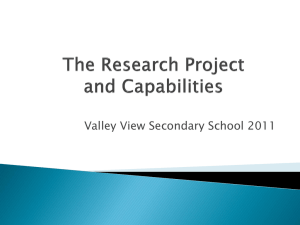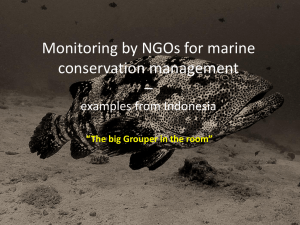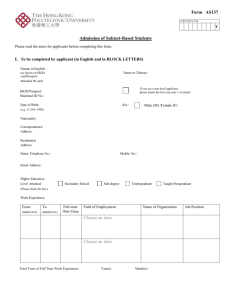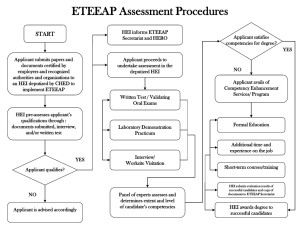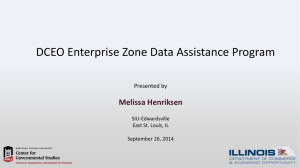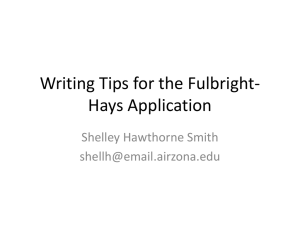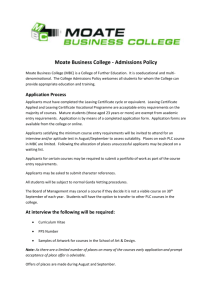Private institutions
advertisement
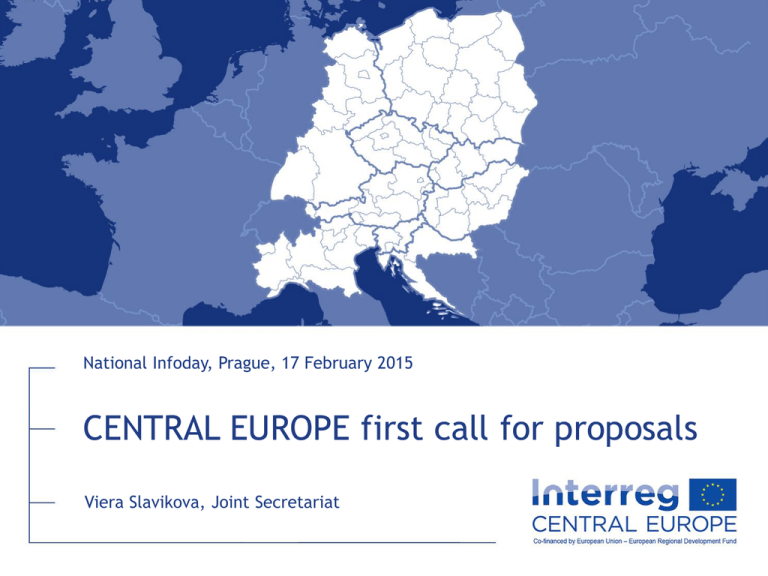
National Infoday, Prague, 17 February 2015 CENTRAL EUROPE first call for proposals Viera Slavikova, Joint Secretariat First call key features Budget: up to EUR 80 million ERDF Themes: all programme priorities all programme specific objectives Procedure: competitive two-step call Submission: online application form Launch (step1): 12 February 2015 Closure (step 1): 13 April 2015, 6 pm Who can participate? Public institutions (national, regional, local; including EGTC) Private institutions (including private companies, having legal personality) International organisations acting under the national law of any CENTRAL EUROPE Member State or, with restrictions, under international law o Private institutions can be lead partners in all programme priorities o Private lead applicants must fulfil minimum financial capacity requirements (self-assessment tool) Project partnership & characteristics At least three financing partners from three countries, at least two of them located in the CENTRAL EUROPE area Recommended financial size: EUR 1 to 5 million total project budget (smaller or larger projects acceptable in exceptional cases) Recommended maximum size of the partnership: 12 partners, it should reflect project scope and stay manageable (larger partnerships not excluded if justified) Recommended project duration: 30 to 36 months (up to maximum 48 months) Features of successful projects • • • • • • • • • Transnational and territorial relevance Relevance and capacity of the partnership Delivery of concrete and measurable results reflecting a change Durability of outputs and results Coherence (work plan) Strategically relevant Communication Effective project management Sound budget Programme/project intervention logic Competitive two-step procedures Application form (light and full AF) Light AF (step 1) Section A Headers (sub-sections) Full AF (step 2) Headers (sub-sections) Project overview Project overview A.1 Project identification A.1 Project identification A.2 Project summary A.2 Project summary Indicative project budget (total per partner - table only in step 1) A.3 Project budget breakdown per partner summary - A.4 List of project outputs B Project partners Project partners B.1 Lead partner/project partners B.1 Lead partner/project partners B.2 Associated partners (if applicable) C Project description Project description C.1 Project relevance C.1 Project relevance C.2 Project focus C.2 Project focus C.3 Project context C.3 Project context C.4 Horizontal principles and additional indicators Work plan Work plan (including time line) D.1 Summary description of thematic work packages D.1 Work package description D D.2 Target groups D.3 Periods D.3 Periods D.4 Activities outside the programme area E/F Partner budget Project budget Indicative project budget per partner (table only in step 1) E Partner budget F Project budget overview G Annexes Annexes Lead applicant declaration Lead applicant declaration Partner declarations Supporting documents for private lead applicants (if applicable) Continuity requirements between step 1 and 2: • Project objectives • Partnership No change of lead applicant Limited flexibility of partner changes • Budget Limited flexibility Assessment: step 1 of the call • To programme intervention logic • To challenges/ needs of programme area • Transnational added value PARTNERSHIP RELEVANCE Strategic criteria: relevance and transnational dimension of applications as well as the extent of their contribution to achieving a programme specific objective • Partnership relevance and suitability • Transnational cooperation character Assessment: step 2 of the call Programme support to applicants Website documents: Interreg CENTRAL EUROPE Cooperation Programme Application package for the first call (Call announcement, application manual, AF templates, supporting tools) Thematic studies analysing 2007-2013 projects National info-days Transnational lead applicant training (step 1: 10 March 2015) Information and guidance by the network of national contact points Individual consultations with the joint secretariat Application manual Combines both comprehensive information on programme framework and targeted guidance to applicants for each step of the call (including practical hints and examples) Modular structure consisting of 5 parts A. What is Interreg CENTRAL EUROPE B. What projects we are looking for C. How to develop a good project D. How to apply with us (including info about the online submission system) E. What support we offer ANNEXES Electronic monitoring system (eMS) https://ems.interreg-central.eu helpdesk@interreg-central.eu • • • • • IMPORTANT NOTICE: Person/user creating the application form (AF) must represent (or be delegated by) the lead applicant institution, should preferably be the contact person of the lead applicant. Can then give user rights to other registered users. Always remember to save the data before leaving a section in the AF. AF can be submitted only by the user who created it. As annex to AF only one document needs to be uploaded in step 1: Lead applicant declaration After hitting the submit button, AF is considered as final and cannot be changed anymore! Electronic monitoring system (eMS) Programme support to applicants www.interreg-central.eu Contact Interreg CENTRAL EUROPE Programme Joint secretariat Kirchberggasse 33-35/11 1070 Vienna Austria Phone Mail Web FB LinkedIn Twitter +43 (0) 1 8908 088 - 2403 helpdesk@interreg-central.eu www.interreg-central.eu www.facebook.com/CentralEuropeProgramme www.linkedin.com/in/CentralEuropeProgramme @CEProgramme




